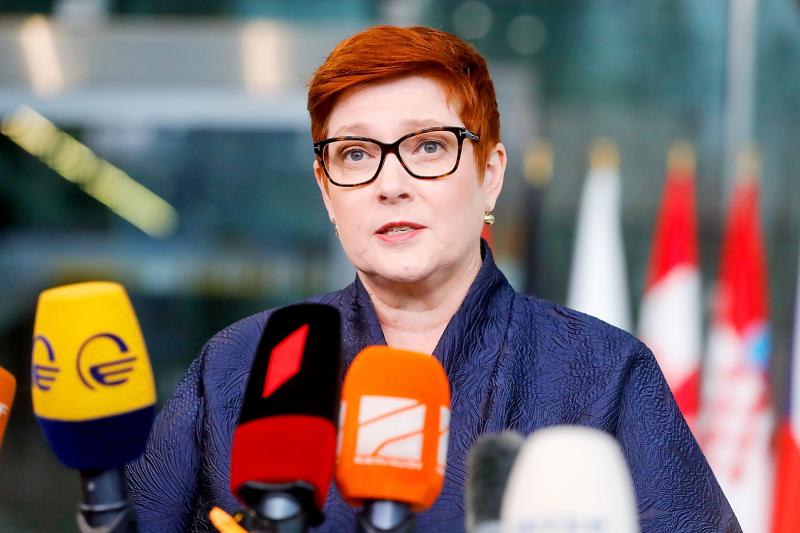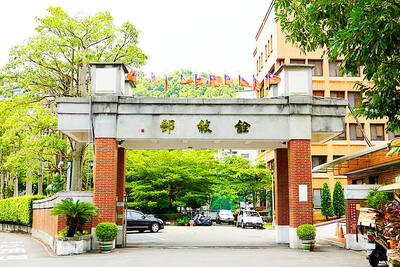Australia’s foreign minister has met her Solomon Islands counterpart for the first time since the South Pacific island nation signed a security pact with China.
Australian Minister of Foreign Affairs Marise Payne yesterday said she met Solomon Islands Development Planning and Aid Coordination Minister Jeremiah Manele in the Australian east coast city of Brisbane as he transited through the airport on Friday night.
“Australia has been consistent and clear in stating our respect for Solomon Islands’ sovereign decisionmaking, however we have reiterated our deep concerns about the security agreement with China, including the lack of transparency,” Payne’s office said in a statement.

Photo: EPA-EFE
Payne’s office said the pair agreed that Australia remained the Solomon Islands’ security partner of choice and that the Solomon Islands would not host a foreign military base less than 2,000km off Australia’s northeast coast.
Manele could not be contacted for comment yesterday.
Australian Minister for Trade, Tourism and Investment Dan Tehan told Australian Broadcasting Corp that the two ministers had a “very productive conversation.”
A Chinese base in the Solomon Islands was not in the interests of the region, Tehan said.
“What we want to do is to be making sure that we’re presenting a very strong case as to why it is incredibly important that we don’t see militarization of the Pacific islands,” Tehan said.
Tehan said Payne and Manele also discussed how Australian Prime Minister Scott Morrison’s government needed to keep working on the bilateral relationship.
Morrison’s coalition is seeking a rare fourth three-year term in elections on May 25.
The China-Solomon Islands security pact announced last month has become a major focus of the election campaign.
After details of a draft pact were released, Australian Minister for International Development and the Pacific Zed Seselja flew to the Solomon Islands’ capital, Honiara, on April 12 to unsuccessfully ask the government to abandon it.
The opposition Labor Party said at the time that Payne, a more senior minister than Seselja, should have been sent instead.
Opposition leader Anthony Albanese welcomed Payne’s meeting with Manele.
“It’s about time,” Albanese said.
Albanese has also criticized Morrison for not telephoning Solomon Islands Prime Minister Manasseh Sogavare since the pact was signed.
Morrison has said he was following the advice of intelligence officials.
The Labor Party has condemned the pact as Australia’s worst foreign policy failure in the Pacific since World War II. Albanese has promised closer engagement between Australia and its South Pacific island neighbors if Labor wins government.
Australian Home Affairs Minister Karen Andrews has suggested that Beijing timed the pact’s announcement during an election campaign to undermine her Liberal Party’s prospects for re-election.

Taiwan Semiconductor Manufacturing Co (TSMC, 台積電) is expected to start construction of its 1.4-nanometer chip manufacturing facilities at the Central Taiwan Science Park (CTSP, 中部科學園區) as early as October, the Chinese-language Liberty Times (the Taipei Times’ sister newspaper) reported yesterday, citing the park administration. TSMC acquired land for the second phase of the park’s expansion in Taichung in June. Large cement, construction and facility engineering companies in central Taiwan have reportedly been receiving bids for TSMC-related projects, the report said. Supply-chain firms estimated that the business opportunities for engineering, equipment and materials supply, and back-end packaging and testing could reach as high as

CHAMPIONS: President Lai congratulated the players’ outstanding performance, cheering them for marking a new milestone in the nation’s baseball history Taiwan on Sunday won their first Little League Baseball World Series (LLBWS) title in 29 years, as Taipei’s Dong Yuan Elementary School defeated a team from Las Vegas 7-0 in the championship game in South Williamsport, Pennsylvania. It was Taiwan’s first championship in the annual tournament since 1996, ending a nearly three-decade drought. “It has been a very long time ... and we finally made it,” Taiwan manager Lai Min-nan (賴敏男) said after the game. Lai said he last managed a Dong Yuan team in at the South Williamsport in 2015, when they were eliminated after four games. “There is

Democratic nations should refrain from attending China’s upcoming large-scale military parade, which Beijing could use to sow discord among democracies, Mainland Affairs Council Deputy Minister Shen You-chung (沈有忠) said. China is scheduled to stage the parade on Wednesday next week to mark the 80th anniversary of Japan’s surrender in World War II. The event is expected to mobilize tens of thousands of participants and prominently showcase China’s military hardware. Speaking at a symposium in Taichung on Thursday, Shen said that Chinese Minister of Foreign Affairs Wang Yi (王毅) recently met with Indian Prime Minister Narendra Modi during a visit to New Delhi.

FINANCES: The KMT plan to halt pension cuts could bankrupt the pension fund years earlier, undermining intergenerational fairness, a Ministry of Civil Service report said The Chinese Nationalist Party (KMT) caucus’ proposal to amend the law to halt pension cuts for civil servants, teachers and military personnel could accelerate the depletion of the Public Service Pension Fund by four to five years, a Ministry of Civil Service report said. Legislative Speaker Han Kuo-yu (韓國瑜) on Aug. 14 said that the Act Governing Civil Servants’ Retirement, Discharge and Pensions (公務人員退休資遣撫卹法) should be amended, adding that changes could begin as soon as after Saturday’s recall and referendum. In a written report to the Legislative Yuan, the ministry said that the fund already faces a severe imbalance between revenue